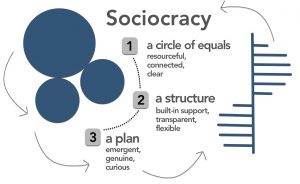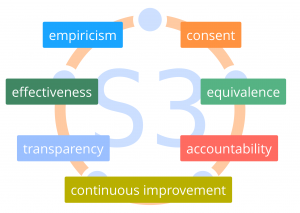On July 14 twenty-four people registered their interest in joining the Cohousing Development Cooperative, and three more have since signed up online. Several of us, constituting the “agenda circle” for the group[*], have been hard at work planning the August 11 meeting as a first opportunity to practice sociocracy (or dynamic governance), which most people see as the best way to run a neighborhood or a cooperative over the long run anyway.
 In the process, we’ve taken a crash course in the model, thanks to Rosemarie Stupel’s series of bite-size videos and other presentations, which I propose to post online for the benefit of all co-op members.
In the process, we’ve taken a crash course in the model, thanks to Rosemarie Stupel’s series of bite-size videos and other presentations, which I propose to post online for the benefit of all co-op members.
This would be part of a new web site, for co-op members, where we can post profiles, projects, and activities — essentially an intranet, accessible to and usable by everyone in the organization.
It’s worth pausing for a moment to recognize just how remarkable it is, that this number of people have already committed to working together to create a collaborative community development organization. Our proposal for the cooperative is posted here, along with a form that people can use to express their interest in joining the organization. But there’s so much more that we can do, if we’re willing to approach it imaginatively and systematically, in order to move most effectively into action.
To do this together, however, we must agree on a process, a way of going about things, and a way of making decisions. This is what sociocracy is for. It’s more time-consuming at the outset, but will ultimately make everyone’s job easier, by using the combined strengths, skills, and efforts of all of the members working effectively together. Effectively, we need to build the foundation of the organization on a set of shared agreements and understandings about how things work and how things should get done.
 Here are the principles that sociocracy embodies in practice:
Here are the principles that sociocracy embodies in practice:
- Consent
- Equivalence
- Accountability
- Continuous Improvement
- Transparency
- Effectiveness
- Empiricism
Most of these are straightforward, but some require more detailed explanations of how they are embodied in the everyday processes of sociocratic decision-making. What we’re proposing for August 11 is a somewhat rudimentary form of this, just to get the process started. There’s nothing like learning a language by starting to practice it together. So we’ll explain how sociocracy uses “rounds,” to get consent, address questions and concerns, and make decisions on everything from the agenda itself, to how the organization should be structured, to what we can do to support the development of cohousing neighborhoods and ecovillages.
The more rapidly we can learn the process, the more effective we’ll be at getting things done in a way that’s efficient while being fully participatory and using the wisdom of the community to make the best choices as we go along.
So we’re going to make some special requests of people attending the meeting on August 11. One is to come a few minutes early, so that we can actually start the meeting on time. Another is to “try out” the dynamic governance model by playing along with some fairly simple instructions and facilitative practices. One of these, not necessarily exclusive to sociocracy, is the use of colored cards to signal immediate reactions to well-formed proposals.

The colors we’re using are similar to those described during Chuck Durrett’s workshop:
- Green = Consent, No Objection
- Blue = Suggestion
- Yellow = Question
- Orange = Concern
- Red = Serious Objection
The plan is to have a “check-in,” get consent to the agenda, and propose to break into sub-circles for the meeting (and going forward for a few meetings), to deal with
- Developing a Vision/Mission description that everyone can find inspiring
- Establishing the Group Process
- Discussing the Organizational Structure
- Doing Neighborhood Coordination
These sub-groups will each have time to discuss these topics and use sociocracy to formulate proposals, make decisions, and select leaders and delegates for the coordinating circle. Specifically, the four circles will need to:
-
- Share contact information
- Plan a meeting date (probably a call)
- Identify 2 roles — a leader/executive who will focus on implementing their decisions; plus a delegate who is responsible for communication to the coordinating circle. These two people will then be part of the coordinating circle (so they need to be willing to participate in regular calls with the coordinating circle in addition to their work with their circle).
- Start thinking through what they want to accomplish and how to go about it.
They will then report back to the larger group.
Shortly we’ll be sending out a general email about the event, a brief statement on sociocracy and the four circles, an announcement about a community celebration on September 7, a suggested date for a September Co-op meeting (likely the 29th), and for a trip to revisit Rocky Corner on October 5. I’ll link to these as soon as they’re posted.
—Jonathan Cloud
[*] Sue Dupre, Rosemarie Stupel, Larry White, Victoria Zelin, Jonathan Cloud
